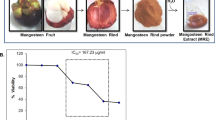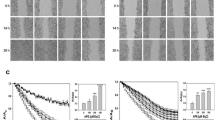Abstract
Recently, epithelial-mesenchymal transition (EMT) has been implicated in human pathology, including fibrosis and cancer metastasis. In this study, we investigated the inhibitory effects of green tea seed (GTS) on the EMT process and migration using the human breast cancer cell line, MDA-MB231. Pretreatment with GTS significantly inhibited migration of breast cancer cells, as measured by monolayer scratch assay. GTS treatment clearly decreased vimentin (a mesenchymal marker) and focal adhesion kinase (FAK) mRNA expression, while E-cadherin (an epithelial marker) expression was significantly increased. Furthermore, GTS also reduced matrix metalloproteinase (MMP)-2 and -9. Taken together, our results demonstrated that GTS inhibits migration of breast cancer cells by suppressing the EMT process via reduction of MMP activities and FAK mRNA expression. Based on these findings, we speculate that GTS might be a potential agent for inhibition of breast cancer cell migration.
Similar content being viewed by others
References
Park S, Bae J, Nam BH, Yoo KY. Aetiology of cancer in Asia. Asian Pac. J. Cancer P. 9: 371–380 (2008)
Park SK, Kim Y, Kang D, Jung EJ, Yoo KY. Risk factors and control strategies for the rapidly rising rate of breast cancer in Korea. J. Breast Canc. 14: 79–87 (2011)
Kawauchi T. Cell adhesion and its endocytic regulation in cell migration during neural development and cancer metastasis. Int. J. Mol. Sci. 13: 4564–4590 (2012)
Millarte V, Farhan H. The Golgi in cell migration: Regulation by signal transduction and its implications for cancer cell metastasis. ScientificWorldJournal 2012: 498278 (2012)
Micalizzi DS, Farabaugh SM, Ford HL. Epithelial-mesenchymal transition in cancer: Parallels between normal development and tumor progression. J. Mammary Gland Biol. 15: 117–134 (2010)
Guarino M, Rubino B, Ballabio G. The role of epithelialmesenchymal transition in cancer pathology. Pathology 39: 305–318 (2007)
Cicchini C, Laudadio I, Citarella F, Corazzari M, Steindler C, Conigliaro A, Fantoni A, Amicone L, Tripodi M. TGFβ-induced EMT requires focal adhesion kinase (FAK) signaling. Exp. Cell. Res. 314: 143–152 (2008)
Huber MA, Kraut N, Beug H. Molecular requirements for epithelial-mesenchymal transition during tumor progression. Curr. Opin. Cell Biol. 17: 548–558 (2005)
Radisky ES, Radisky DC. Matrix metalloproteinase-induced epithelial-mesenchymal transition in breast cancer. J. Mammary Gland Biol. 15: 201–212 (2010)
Sen T, Moulik S, Dutta A, Choudhury PR, Banerji A, Das S, Roy M, Chatterjee A. Multifunctional effect of epigallocatechin-3-gallate (EGCG) in downregulation of gelatinase-A (MMP-2) in human breast cancer cell line MCF-7. Life Sci. 84: 194–204 (2009)
Chow HH, Hakim IA. Pharmacokinetic and chemoprevention studies on tea in humans. Pharmacol. Res. 64: 105–112 (2011)
Kim HJ, Jeon SM, Lee MK, Jung UJ, Shin SK, Choi MS. Antilipogenic effect of green tea extract in C57BL/6J-Lep ob/ob mice. Phytother. Res. 23: 467–471 (2009)
Wu AH, Butler LM. Green tea and breast cancer. Mol. Nutr. Food Res. 55: 921–930 (2011)
Wang Y, Sun D, Chen H, Qian L, Xu P. Fatty acid composition and antioxidant activity of tea (Camellia sinensis L.) seed oil extracted by optimized supercritical carbon dioxide. Int. J. Mol. Sci. 12: 7708–7719 (2011)
Kim NH, Choi SK, Kim SJ, Moon PD, Lim HS, Choi IY, Na HJ, Myung NY, Jeong HJ, Um JY, Hong SH, Kim HM. Green tea seed oil reduces weight gain in C57BL/6J mice and influences adipocyte differentiation by suppressing peroxisome proliferator-activated receptor-gamma. Pflug. Arch. Eur. J. Phy. 457: 293–302 (2008)
Hasegawa T, Akutsu K, Kishi Y, Nakamura K. Constituents of the green tea seeds of Camellia sinesis. Nat. Prod. Commun. 6: 371–374 (2011)
Kushima Y, Iida K, Nagaoka Y, Kawaratani Y, Shirahama T, Sakaguchi M, Baba K, Hara Y, Uesato S. Inhibitory effect of (-)-epigallocatechin and (-)-epigallocatechin gallate against heregulin beta1-induced migration/invasion of the MCF-7 breast carcinoma cell line. Biol. Pharm. Bull. 32: 899–904 (2009)
Tang Y, Zhao DY, Elliott S, Zhao W, Curiel TJ, Beckman BS, Burow ME. Epigallocatechin-3 gallate induces growth inhibition and apoptosis in human breast cancer cells through surviving suppression. Int. J. Oncol. 31: 705–711 (2007)
Dasqupta P, Rizwani W, Pillai S, Kinkade R, Kovacs M, Rastogi S, Banerjee S, Carless M, Kim E, Coppola D, Haura E, Chellappan S. Nicotine induces cell proliferation, invasion, and epithelialmesenchymal transition in a variety of human cancer cell lines. Int. J. Cancer 124: 36–45 (2009)
Yoon WH, Choi JH, Lee KH, Kim CH. Antimicrobial and antitumor activities of seed extracts of Camellia sinensis L. Korean J. Food Sci. Technol. 37: 108–112 (2005)
Bhangu A, Wood G, Mirnezami A, Darzi A, Tekkis P, Goldin R. Epithelial mesenchymal transition in colorectal cancer: Seminal role in promoting disease progression and resistance to neoadjuvant therapy. Surg. Oncol. 21: 316–323 (2012)
Meng Q, Goldberg ID, Rosen EM, Fan S. Inhibitory effects of indole-3-carbinol on invasion and migration in human breast cancer cells. Breast Cancer Res. Tr. 63: 147–152 (2000)
Cary LA, Chang JF, Guan JL. Stimulation of cell migration by overexpression of focal adhesion kinase and its association with Src and Fyn. J. Cell Sci. 109: 1787–1794 (1996)
Polacheck WJ, Zervantonakis IK, Kamm RD. Tumor cell migration in complex microenvironments. Cell. Mol. Life Sci. 70: 1333–1356 (2013)
Lin CY, Tsai PH, Kandaswami CC, Lee PP, Huang CJ, Hwang JJ, Lee MT. Matrix metalloproteinase-9 cooperates with transcription factor snail to induce epithelial-mesenchymal transition. Cancer Sci. 102: 815–827 (2011)
Esfahanian N, Shakiba Y, Nikbin B, Soraya H, Maleki-Dizaji N, Ghazi-Khansari M, Garjani A. Effect of metformin on the proliferation, migration, and MMP-2 and -9 expression of human umbilical vein endothelial cells. Mol. Med. Rep. 5: 1068–1074 (2012)
Lai KC, Hsu SC, Kuo CL, Ip SW, Yang JS, Hus YM, Huang HY, Wu SH, Chung JG. Phenethyl isothiocyanate inhibited tumor migration and invasion via suppressing multiple signal transduction pathways in human colon cancer HT29 cells. J. Agr. Food Chem. 58: 11148–11155 (2010)
Author information
Authors and Affiliations
Corresponding author
Rights and permissions
About this article
Cite this article
Ho, JN., Choue, R. & Lee, J. Green tea seed extract inhibits cell migration by suppressing the epithelial-to-mesenchymal transition (EMT) process in breast cancer cells. Food Sci Biotechnol 22, 1125–1129 (2013). https://doi.org/10.1007/s10068-013-0193-7
Received:
Revised:
Accepted:
Published:
Issue Date:
DOI: https://doi.org/10.1007/s10068-013-0193-7




